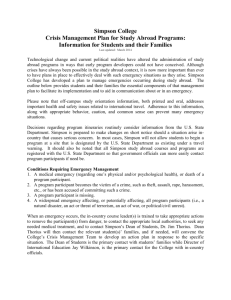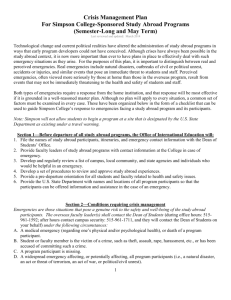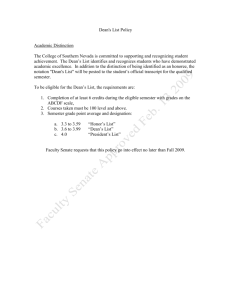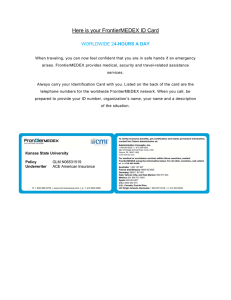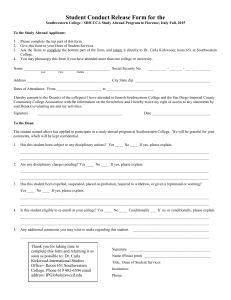Crisis Management Plan
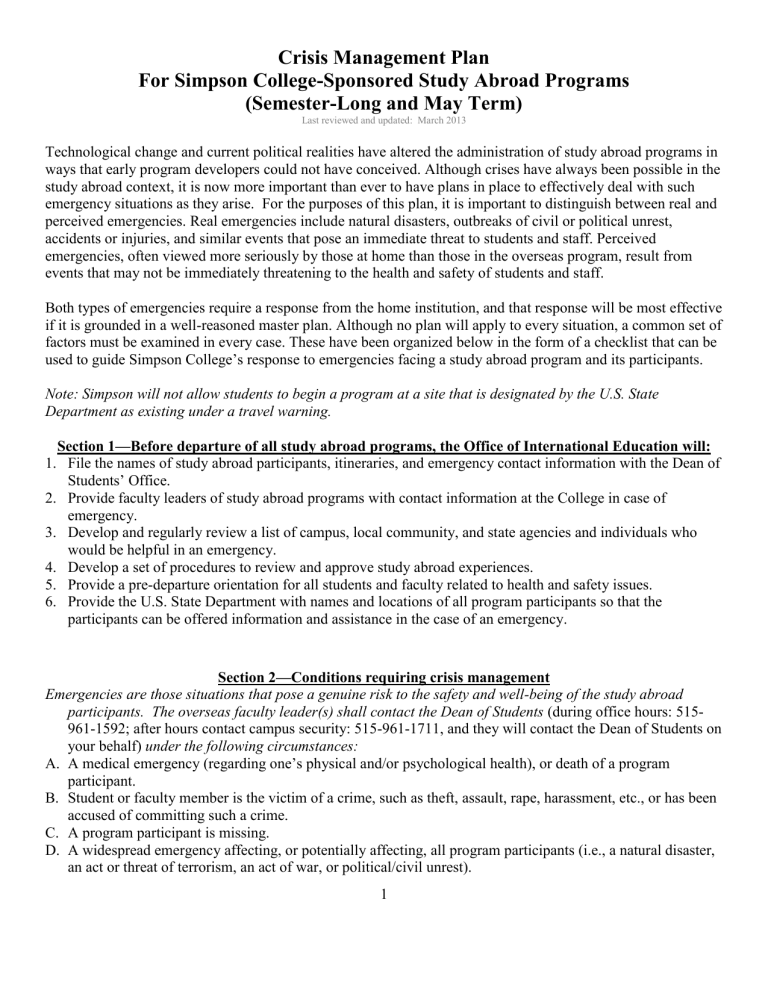
Crisis Management Plan
For Simpson College-Sponsored Study Abroad Programs
(Semester-Long and May Term)
Last reviewed and updated: March 2013
Technological change and current political realities have altered the administration of study abroad programs in ways that early program developers could not have conceived. Although crises have always been possible in the study abroad context, it is now more important than ever to have plans in place to effectively deal with such emergency situations as they arise. For the purposes of this plan, it is important to distinguish between real and perceived emergencies. Real emergencies include natural disasters, outbreaks of civil or political unrest, accidents or injuries, and similar events that pose an immediate threat to students and staff. Perceived emergencies, often viewed more seriously by those at home than those in the overseas program, result from events that may not be immediately threatening to the health and safety of students and staff.
Both types of emergencies require a response from the home institution, and that response will be most effective if it is grounded in a well-reasoned master plan. Although no plan will apply to every situation, a common set of factors must be examined in every case. These have been organized below in the form of a checklist that can be used to guide Simpson College’s response to emergencies facing a study abroad program and its participants.
Note: Simpson will not allow students to begin a program at a site that is designated by the U.S. State
Department as existing under a travel warning.
Section 1—Before departure of all study abroad programs, the Office of International Education will:
1. File the names of study abroad participants, itineraries, and emergency contact information with the Dean of
Students’ Office.
2. Provide faculty leaders of study abroad programs with contact information at the College in case of emergency.
3. Develop and regularly review a list of campus, local community, and state agencies and individuals who would be helpful in an emergency.
4. Develop a set of procedures to review and approve study abroad experiences.
5. Provide a pre-departure orientation for all students and faculty related to health and safety issues.
6.
Provide the U.S. State Department with names and locations of all program participants so that the participants can be offered information and assistance in the case of an emergency.
Section 2—Conditions requiring crisis management
Emergencies are those situations that pose a genuine risk to the safety and well-being of the study abroad participants. The overseas faculty leader(s) shall contact the Dean of Students (during office hours: 515-
961-1592; after hours contact campus security: 515-961-1711, and they will contact the Dean of Students on your behalf) under the following circumstances:
A. A medical emergency (regarding one’s physical and/or psychological health), or death of a program participant.
B. Student or faculty member is the victim of a crime, such as theft, assault, rape, harassment, etc., or has been accused of committing such a crime.
C. A program participant is missing.
D. A widespread emergency affecting, or potentially affecting, all program participants (i.e., a natural disaster, an act or threat of terrorism, an act of war, or political/civil unrest).
1
If the faculty leader(s) becomes incapacitated, a pre-determined emergency liaison will serve to manage the onsite situation and the other program participants.
Section 3—Faculty course leader(s)’ responsibilities when an emergency occurs
Should one of the above described situations occur, the in-country faculty member(s) (or the pre-determined emergency liaison) should take the following action:
A. Remove the participant(s) from danger.
B. Contact the appropriate local authorities (i.e., police, medical personnel, U.S. Embassy or Consulate) to begin the local action necessary to handle the situation.
C. Contact the Dean of Students at Simpson (during office hours: 515-961-1592; after hours contact campus security: 515-961-1711, and they will contact the Dean of Students on your behalf).
D. Contact FrontierMEDEX for assistance in evaluating the situation. From within the U.S. & Canada call 1-
800-527-0218; from outside the U.S. or Canada ask the international operator to place a collect call to
FrontierMEDEX in Baltimore, Maryland at 410-453-6330, and reference Simpson’s EIIA Policy # 352191.
The Dean of Students (Jim Thorius) is the primary contact for/to parents. The International Education
Coordinator (Jay Wilkinson) is the primary contact for the College with in-country officials. A college official designated by the President will act as the official spokesperson to media sources.
Section 4—Dean of Students’ responsibilities when an emergency occurs
I. Upon receiving a call from an on-site study abroad program faculty (or pre-designated student) concerning a serious illness, injury, death, or emergency, the following actions will be taken:
A. Begin a log of all calls and activities pertaining to the incident.
B. Obtain the following information from the on-site faculty (or pre-designated student) caller:
1. Name of caller
2. Identity of injured/victim(s), if applicable
3. Brief description of accident, illness, or emergency
4. Location of caller (e.g., address, city, country)
5. Location of accident or emergency; proximity to Simpson program participants
6. Phone and fax number where caller can be reached
7. Verify that calls have been placed to emergency response services, and will be placed to U.S.
Embassy/Consulate if situation warrants
8. Determine what information, if any, has already been released to the media
9. If appropriate, instruct caller to call back after emergency response team and/or law enforcement have arrived
C. Immediately notify the following in order of needed response: College President, Chaplains, Director of the Counseling Center, Executive Director of College Relations, and/or Associate Dean of Students.
D. The Dean of Students, in consultation with the International Education Coordinator, will proceed with appropriate steps as suggested below.
II. For a medical emergency (physical and/or psychological) involving a program participant, the Dean of Students will:
A. Contact FrontierMEDEX for assistance in evaluating the situation. From within the U.S. & Canada call
1-800-527-0218; from outside the U.S. or Canada ask the international operator to place a collect call to
FrontierMEDEX in Baltimore, Maryland at 410-453-6330, and reference Simpson’s EIIA Policy # 352191.
B. Contact parents of student or the family of faculty member(s) or their designated emergency contacts to
2
apprise them of the situation.
C. Contact the Dean for Academic Affairs.
D. Brief official College spokesperson.
E. Working with the International Education Coordinator who will make the in-country contacts, provide for necessary medical care, emergency evacuation, etc.
F. Contact the Business Office to make funds available to cover emergency expenses, if necessary. Such expenses are the responsibility of student/parents or the faculty member(s), but Simpson will advance funds as needed to assure a timely resolution of the situation.
G. Consult with College legal counsel as appropriate.
III. For the death of a student or faculty member, the Dean of Students will :
A. Contact FrontierMEDEX for assistance in evaluating the situation. From within the U.S. & Canada call
1-800-527-0218; from outside the U.S. or Canada ask the international operator to place a collect call to
FrontierMEDEX in Baltimore, Maryland at 410-453-6330, and reference Simpson’s EIIA Policy # 352191.
B. Contact parents of student or their designated emergency contacts following guidelines detailed in the
College’s Emergency Preparedness Plan.
C. Contact the Dean for Academic Affairs who will then contact the family of faculty member(s) or their designated emergency contacts following guidelines detailed in the College’s Emergency Preparedness
Plan.
D. Contact the College President and the College Chaplains.
E. Contact the Counseling Center to begin appropriate counseling for other members of the group.
F. Brief official College spokesperson.
G. Consult with College legal counsel as appropriate.
IV. If a student or faculty member is the victim of a crime, such as theft, assault, rape, harassment, etc., or has been accused of committing such a crime, the Dean of Students will:
A. Contact the Dean for Academic Affairs.
B. Brief official College spokesperson.
C. Contact FrontierMEDEX for assistance in evaluating the situation. From within the U.S. & Canada call
1-800-527-0218; from outside the U.S. or Canada ask the international operator to place a collect call to
FrontierMEDEX in Baltimore, Maryland at 410-453-6330, and reference Simpson’s EIIA Policy # 352191.
D. If the incident is between two students of the group, the Dean of Students has primary responsibility and
College policy will apply.
E. If the incident is between a Simpson student and a Simpson faculty member, either the Dean of Students or Dean for Academic Affairs will have primary responsibility and College policy will apply.
F. If the incident is between a member of the group and an outside party, action taken will depend on legal requirements in the host country and the wishes of the group member.
G. Consult with College legal counsel as appropriate.
H. Working with the International Education Coordinator who will make any necessary in-country contacts, local on-site authorities will be consulted, if necessary, for appropriate action.
I. Contact parents of student or the family of faculty member(s), or their designated emergency contacts.
V. In case of a widespread emergency affecting, or potentially affecting, all program participants (i.e., a natural disaster, an act or threat of terrorism, an act of war, or political/civil unrest), the Dean of
Students will:
A. Ask the faculty member(s) leading the course what they know about the situation.
1. What was the target of unrest, if event was political?
2. What is the intensity of the emergency or political unrest?
3
3. Are there military or emergency personnel at the site of the emergency?
4. What is the advice of the nearest U.S. Embassy or Consulate?
5. What impact, if any, did the emergency have on availability of food, water, and medical supplies?
6. How able are our students and faculty to travel?
7. Is continuation of classes in the best interests of students’ health and safety?
B. Will take the following appropriate actions, in consultation with the International Education Coordinator and the College President, as required by the emergency situation:
1. Contact U.S. State Department a. For information regarding the situation in a specific country, call 202-647-4000 and ask for the
Desk Officer for the country affected. b. For assistance dealing with serious illness, death, financial crisis due to theft, or arrest, call the
Overseas Citizen Services toll-free in the U.S. 1-888-407-4747 outside the U.S. 202-501-4444, from
7 a.m. - 7 p.m. CST, Mon. - Fri., after hours call 202-647-4000 and ask for the Overseas Citizens
Services Duty Officer. c. For information concerning a terrorist threat or action, call the Counter-Terrorist Office at 202-
647-9892.
2. Call a meeting of the Crisis Management Committee (as defined by the College’s
Emergency Preparedness Plan) which will also include the International Education
Coordinator. In developing an action plan in response to the specific situation, the group must consider: a. Any immediate measures needed to preserve the health and safety of students and faculty; b. The appropriate course of action overseas (dealing with initial student reaction, reiterating appropriate student behaviors, developing a written course of action, and having students acknowledge in writing receipt of such information; c. Developing and assisting with an evacuation plan, if necessary (considering the safety of various modes and routes of travel, the costs of evacuation and the method of meeting those costs, the possibility of reducing the level of threat by dispersing students in small groups to reconvene later in another locale, and available in-country resources), based on advice from the U.S. State Department and Simpson in-country faculty leader(s). Options include evacuation, move to U.S. Embassy compound, or remaining on-site and maintaining a low-profile. d. Designating one person (and a back-up) to assume responsibility for the situation at Simpson. e. Developing a communication document to be utilized by all individuals involved
(consistency is crucial); while keeping in mind the privacy of students and faculty involved. f. Preparing a list of individuals to be alerted once the entire plan is in place
(including the College President, Board of Trustees, Simpson faculty, staff, and students, and parents and family of those students and faculty abroad. g. Developing a crisis communication plan (see the College’s Emergency
Preparedness Plan for details) which factors in the people to be included, organizations to notify, and effective methods of communication to utilize (including website). h. Providing the College’s designated official spokesperson with a daily bulletin until the crisis is over. i. Assessing the impact of the event, once ended, and documenting all actions taken in a written report.
4
j. Developing a plan to notify all parents, family members, and/or emergency contacts of those abroad, and to coordinate the response to subsequent phone calls. k. Submitting an action plan to the College President for a final decision, and once the plan is finalized, transmitting it to the on-site faculty member(s).
Section 5—When a widespread emergency occurs, on-site faculty member(s) assumes responsibility for ensuring that:
A. Students are gathered and told of the emergency.
B. Students are reminded of behaviors that draw attention to themselves as being
Americans, and agree to avoid those behaviors.
C. Students are asked to report any suspicious persons or packages.
D. If authorized by the crisis management team, students will be given the opportunity to return to the U.S. immediately with no financial penalty and with the assurance that an effort would be made to salvage the semester to the extent feasible.
E. If directed by the crisis management team, the faculty member(s) takes added security precautions at the classroom site (including the removal of all U.S. program identification).
F. If directed by the crisis management team, the faculty member(s) maintains daily contact with the Office of International Education and provides students with daily bulletins, if appropriate. The faculty also should offer counseling and support to the students, to the extent possible, and get additional, local counseling assistance, if needed.
5
